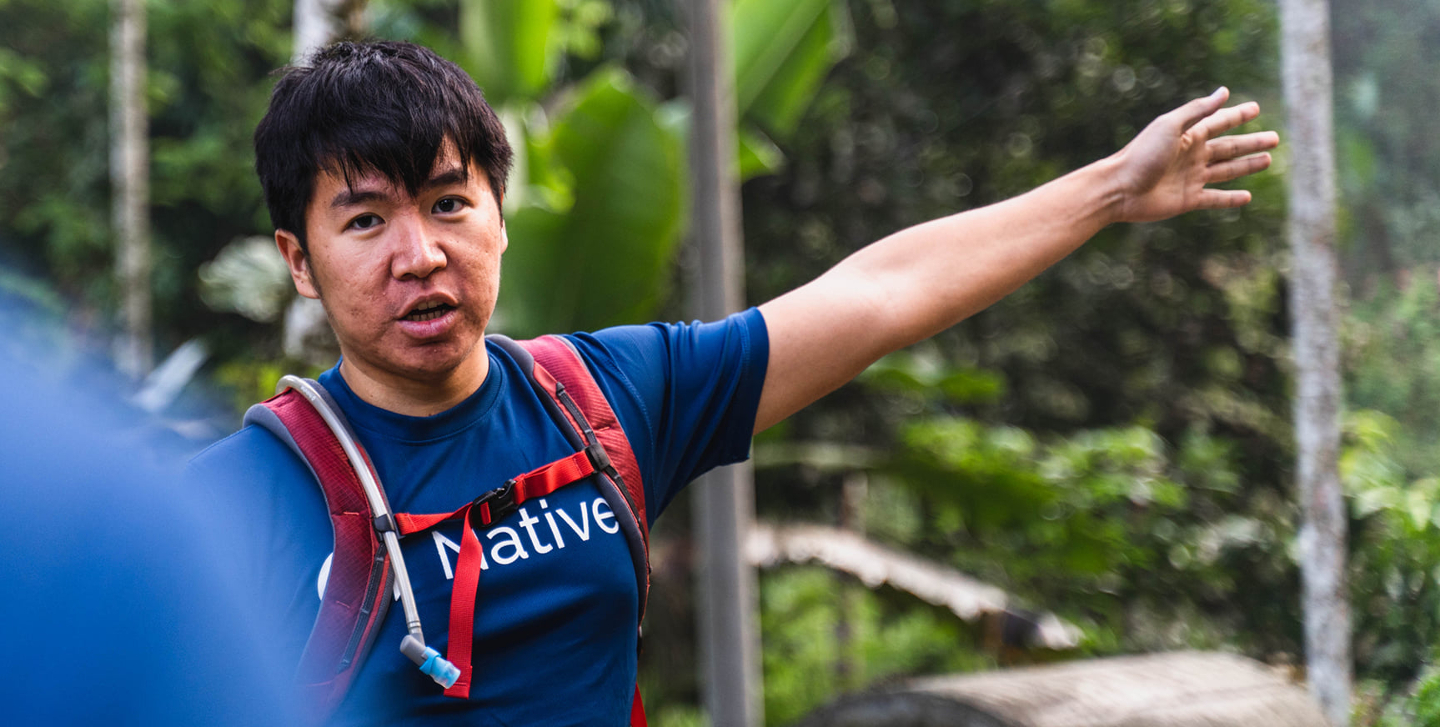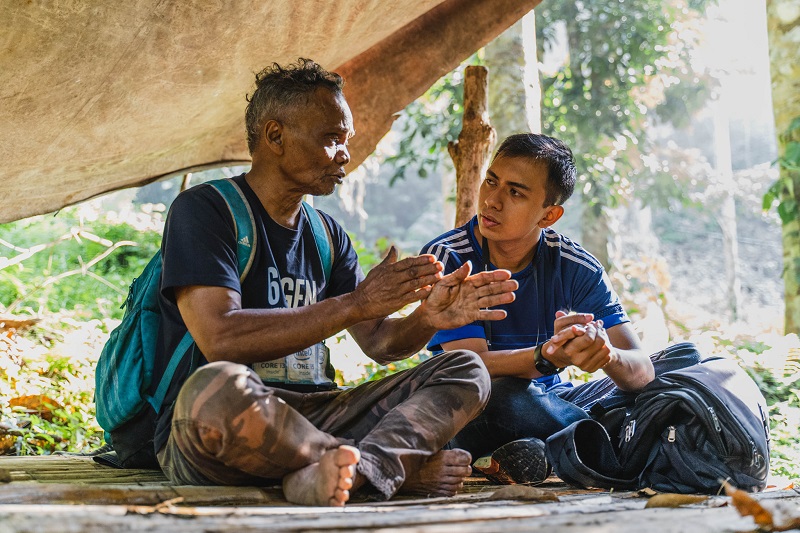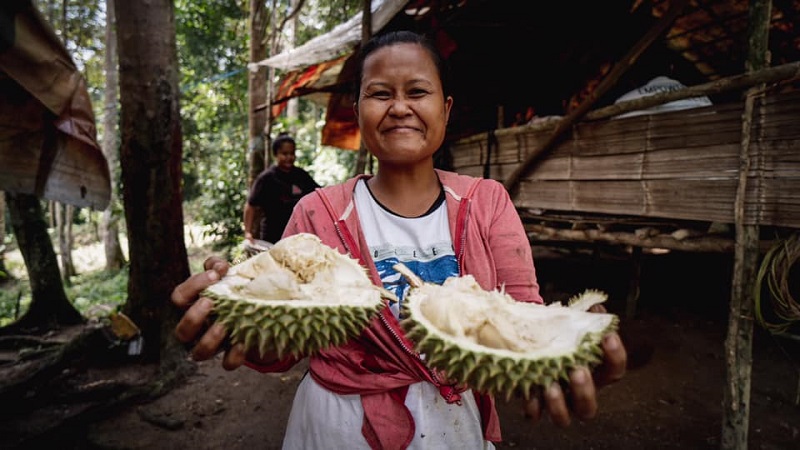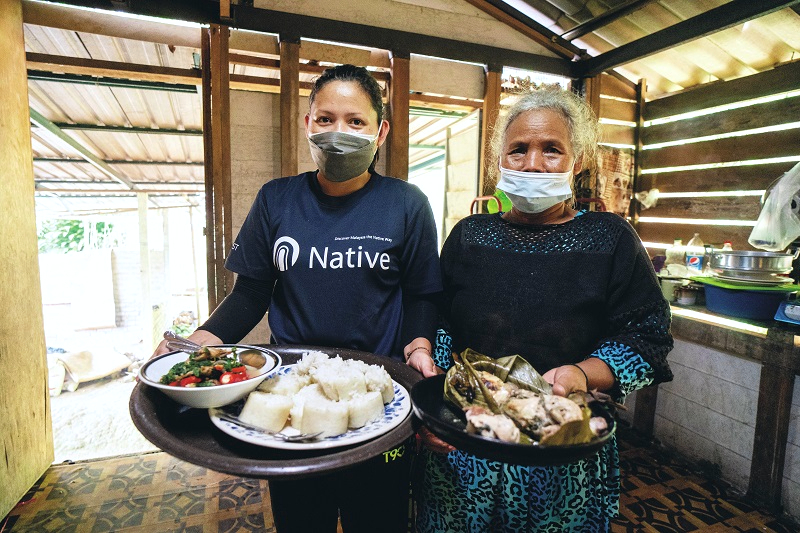
Running Biji Bumi Durian has been a learning process for both the Orang Asli and Teoh, who found that entrepreneurs
need not have a lot of technological knowledge to get things done (All photos: Native)
Doing business with the Orang Asli takes more than gathering a group of them and bringing their produce to market. The seed of any venture has to be transparent from the start, and needs time to grow, says Daniel Teoh, founder of social enterprise Native.
“You can’t go into a village and say, ‘20 of you, come and let’s do business together’. It’s more like, ‘Next week, I’m thinking of doing something. This is how it works; this is what we need. Who wants to do it with me?’ Maybe you ask one guy, who says, ‘Okay lah, I try’. If he likes it, he invites his neighbour, who may then ask another to join in.”
This trickle-down approach suits Teoh, who does not aim to engage a whole kampung at one go. “You want individuals who understand what you want to do and trust you. The incentive is to earn a livelihood from the business, but they need to have a certain drive and ambition.”
Still, the going is tedious, the numbers are small — an average village has 300 people, or 80 to 100 families — and any initiative requires loads of patience and planning. “We may work with about five families, but we believe these are the people who will build the foundation of what will become the village economy within their community. It’s slow work but we think it can be done.”
discover_native.jpg

Flexibility is key when things do not go as planned. In 2018, a year before Native was registered, Teoh and some friends began providing tours to an Orang Asli village in Selangor, where visitors get a taste of life in the indigenous community. “We did it for fun to see how far this could go and found it could go somewhere.”
With Native up and eager to get going, they brought out craft kits showcasing the traditional Orang Asli art of weaving mengkuang leaves into headbands, bookmarks and other items. But that effort proved unscalable because materials were scarce and it lacked the volume to be profitable and sustainable. Product development was another challenge because when Covid-19 crept in, it was not feasible to spend time in the village.
So when the villagers suggested durians, Teoh toured the orchards during the break between the first and second lockdowns and learnt that every tree has a name and every fruit is different although they are all forest varieties. “With that knowledge, we launched Biji Bumi Durian in 2021. That scaled up the business: We sold one ton of the fruit in 2020 and 3.5 tons last year.”
Native, an ecommerce setup, sources its supply from Orang Asli in Ulu Selangor, who get 40% of the takings. It is a fair percentage, Teoh thinks, after factoring in logistics, salaries, marketing and other costs. “We pay them RM8 to RM25 per kilo, depending on the type of durian. They are aware of how much we sell it for and how much goes to them.”
native_durian.jpg

Traditionally, the Orang Asli are either durian growers or retailers; they rarely do both. Rather than risk not being able to sell, they might push off what they harvest to the towkay durian, who then sweeps up the lot at RM3 or RM4 per kilogram.
“The ambition is to train the villagers to understand the entrepreneurial aspect of the business, such as pricing and margins, marketing and sale, recognise the value of what they are doing, be more savvy and, eventually, take ownership of the business, leaving Native to coordinate the customer service aspects. We can slowly pay them more as well and enter a profit-share agreement.”
Teoh, who did not like, much less eat, durians — “it’s actually not bad” — until his latest venture, now wants to tell those who crave the king of fruits that the kampung varieties may seem like a low-value business opportunity compared with the Musang King, but they have their own appeal. Higher-grade strains can fetch prices close to the latter’s. On top of taste, the indigenous stories behind the durian kampung grown in centuries-old forests are another pull factor.
His personal experience of working with indigenous communities has put to rest his belief that entrepreneurs need a lot of technological know-how to get things done. One can learn things along the way and it makes a difference knowing how things work, he finds. Like how to identify a good durian by tapping it with his fingers, or sniffing a fruit to see if it is spoilt.
orang_asli_women_food1.jpg

Teoh’s aspiration to be a social entrepreneur was stoked by a Singapore International Foundation (SIF) grant he received after winning its Young Social Entrepreneurs Programme (YSE) in 2019. Three years earlier, while studying engineering at the University of Nottingham in Semenyih, he had volunteered with social enterprise Epic Collective to build homes for indigenous villagers near the campus. He convinced his lecturer to let him do his dissertation on Orang Asli housing and ended up working with Epic after obtaining his master’s degree — a stint which ascertained that civil engineering, despite his conservative parents’ hopes, was not for him.
How Native came to be was a matter of “following the motion of things”, he recalls. “Airbnb had just made its entry into Malaysia and they shot Epic an email saying, ‘We see you are working with Orang Asli. Do you want to do something on our platform?’”
When Teoh’s boss suggested that he “go and play lah”, he wrote to Airbnb, then visited the Orang Asli community and said, “Let’s do this”.
Subsequently, he got the SIF grant. “It enabled us to start a team and equipped us with the resources to keep going. It validates that we have a role to play and gave us the confidence that we can be a proper enterprise and to keep dreaming.”
Last November, Native was one of two winners of the SIF-Deutsche Bank Made for Good Award, which seeks to support and encourage social enterprises that have adapted their business in resilient and innovative ways despite the challenges posed by the Covid-19 pandemic.
The other winner was Mitti Café of India, which provides experiential training and employment to adults with physical and intellectual disabilities. Both social enterprises, which beat other alumni of SIF’s YSE global and regional programmes, will receive US$7,370 (about RM31,000) each.
Teoh feels that the pull of an Orang Asli-based tourism business comes from helping to preserve things related to its traditions and culture, such as lifestyle skills, crafts, stories, knowledge of herbs and plants, and recipes (fancy a curry dish that uses rubber seeds and leaves from the tree?). The name Native itself reflects its quest to make the abundant natural assets these communities have something they can be proud of, and that should be recognised and valued.
He looks forward to the next durian season in June and hopes for a good crop, although there is no telling until the trees start flowering. Meanwhile, tours restarted last December and they are introducing shorter stays with different individuals in the kampung, so visitors can do something new each time they go.
Looking ahead, Teoh wants to keep building local capacity and become a more platform-based venture, diversify what Native has to offer — Covid-19 has shown that tourism is a vulnerable industry — and incorporate more technology in its business. “To put it simply, we want to be an Airbnb for Orang Asli experiences.”
He is also tinkering with the idea of using the cultural elements unique to the community to generate art pieces and then turn them into non-fungible tokens, which can be sold to fund the development of certain infrastructure and other things that can generate fiat. The NFTs can also serve as a VIP pass for native experiences.
“The idea excites me but there’s a lot to be done first. It’s not as simple as doing a bunch of drawings. We are in discussions with Orang Asli artists about an NFT project. Most communities have one or two artists who are probably undiscovered. You can imagine going to the kampung and trying to explain this to them.”
Teoh never imagined he would set up Native or follow the scent of durians to a new venture. But, having gone where opportunity led in the last few years, many ideas are viable to this enterprising 28-year-old.
This article first appeared on Feb 7, 2022 in The Edge Malaysia.


